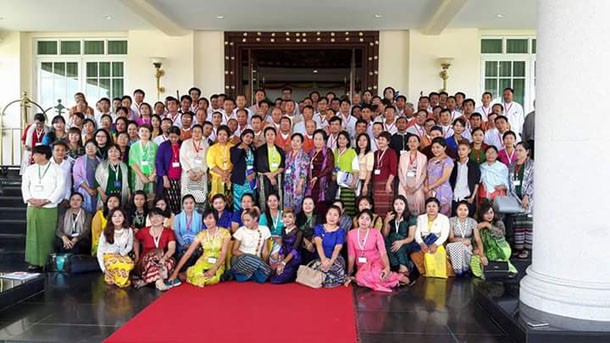NAYPYIDAW — Women’s rights activists urged legislators to enact a gender quota system to increase women’s representation in political leadership at a panel discussion in Naypyidaw on Saturday.
The “Women’s Empowerment Leads to True Transformation” workshop was organized by the Women’s Organizations Network (WON) and the Gender Equality Network (GEN), and attended by about 300 participants including legislators and activists.
Gender equality activists said that political parties should initiate progress by instituting internal quota systems, and then introducing quotas to political leadership once in office.
“The panel discussion focused on gender quotas, which we need laws and policy for,” said Nang Phyu Phyu Lin, steering committee member of the GEN. “For this, we rely on the legislators.”
She said the groups shared research findings on the advantages and disadvantages of gender quotas at the introductory meeting between new government representatives, lawmakers and women’s rights groups.
Despite Aung San Suu Kyi’s prominent leadership role as State Counselor, foreign affairs minister and chairwoman of the National League for Democracy (NLD) party, women hold drastically less than 30 percent of the positions in the legislative and executive sectors—the goal outlined in the 1995 Beijing Platform of Action, to which Burma was party along with numerous other countries.
After November’s general election, women parliamentarians hold 13 percent of elected seats in the Union Parliament. When included with the military appointees to Parliament, that number drops to about 10 percent—double what it was in the last session of Parliament after the 2012 by-election. Burma’s cabinet currently contains only one woman: Suu Kyi herself.
Rights activists said that gender quotas would be an immediate response to overcoming the injustice of the former system. Quotas would play a key role in improving women’s opportunities for political leadership, said Nang Phyu Phyu Lin.
“The quota system that we have been asking for is temporary. We will not accept the argument that quotas may bring unqualified women into leadership roles. Nobody was born with these skills; we have to be empowered and learn them through experience,” she added.
Campaigns to set a minimum quota for women’s representation at 30 percent have been active, predominantly with previously exiled women’s rights groups such as Women’s League of Burma (WLB). Gender rights activists have increasingly raised the issue within Burma since the shift to a quasi-civilian government in 2011 and throughout the democratic transition.
Last year, lawmaker Khin Saw Wai from the Arakan National Party (ANP) raised the issue in Parliament, but to no avail. In Burma, some lawmakers still view gender equality as a taboo subject.
Shwe Shwe Sein Latt, NLD lawmaker and renowned women’s rights advocate said gender inclusion in every sector, from grassroots to Parliament, is “a delicate matter that requires a careful approach.”
“Awareness about gender equality needs to be introduced to the new parliamentarians, as we [rights advocates] did in the past with lawmakers from the first-term parliament,” she said. “We need to build greater awareness by sharing with the new lawmakers.”
She echoed the importance of political parties initiating the quota system internally as a first step.

















